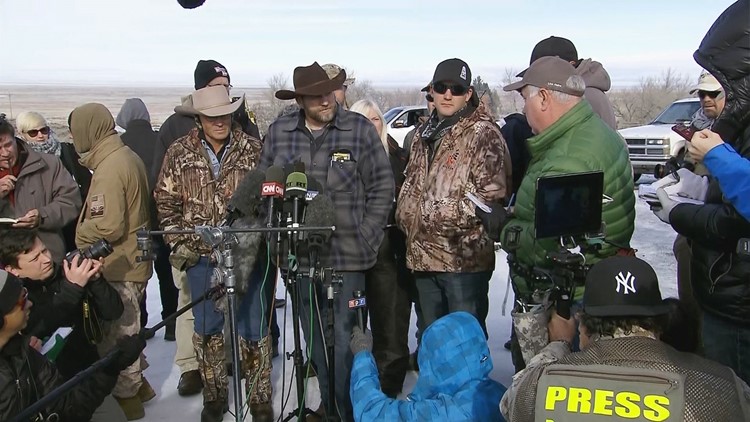BOISE - In a response to the ongoing armed occupation of a wildlife refuge outside of Burns, Oregon, the Idaho Cattle Association said that while they understand the group's grievances, their actions are not justified.
The group of ranchers and militia calling itself Citizens for Constitutional Freedom has been occupying a federal building at the Malheur National Wildlife Refuge since Saturday. They are demanding that authorities look into claims that local ranchers have been intimidated by the federal government and forced off their land.
They claim that they will leave when a plan is in place to turn over management of federal lands to locals. The group's spokesman, Ammon Bundy, has also said that two local ranchers who reported to federal prison Monday for setting fire to federal land have been treated unfairly.
In a written statement to KTVB, Wyatt Prescott, executive vice president of the Idaho Cattle Association, said that there exists a double standard when it comes to "bearing the responsibility of errors in land management and wildlife suppression efforts." But, Prescott said, that does not excuse the illegal takeover of a federal facility and is the actions taken by the group are "not representative of our ranching community."
The solution, according to the ICA lies in collaboration with federal land agencies, not through the use of armed force.
"We want to work with the agencies and with lawmakers within the structure of law to correct the over-reaching policies that only serve to damage valuable working relationships, destroy livelihoods, and prevent the best care for the land and wildlife," Prescott said in the statement. "We believe there are appropriate avenues to take when working with administrative agencies, and we take those steps when the need arises in order to maintain civilized working relationships between permittees and agency officials."
Prescott noted that the ICA continually fights grazing restrictions and that working with the federal government is difficult due to a "land management system that is mired in bureaucracy and over-regulation to the extent that decisions can no longer be made by land managers on the ground, where they belong."
Here is the full Q&A with ICA Vice President Wyatt Prescott:
How do ranchers feel that land is managed by the government?
Idaho ranchers have a proven history of cooperation with federal land managers and continue to seek collaborative solutions to complex land management issues. It is unfortunate, however, that in recent years well-intended federal laws have been manipulated by the legal maneuverings of anti-use activists and extremist organizations. The result of these efforts is a land management system that is mired in bureaucracy and over-regulation to the extent that decisions can no longer be made by land managers on the ground, where they belong.
The current cycle of recurring catastrophic wildfires on our public lands is the perfect example of how federal land management is not working. Decisions about optimum management for the land, its conservation and use, are prevented by the overgrown bureaucracy.
Do some feel as though federally-owned land should be relinquished by the government to people/ranchers?
While we certainly believe that federally owned land could be managed more effectively and sustainably if under a different, more flexible management scheme, we also understand that there are many legal complexities to the transfer of public lands.
What are the association's general thoughts on what is happening in Burns? Are you feeling the same sentiment from ranchers in our area?
There are two separate scenarios playing out in Burns right now. First, a respected ranching family has been dealt a seemingly overly-aggressive hand of justice and has tried to peaceably work through the justice system to seek resolution. It is unfortunate that their efforts have been unsuccessful. From all outward appearances, there is a double standard when it comes to bearing the responsibility of errors in land management and wildfire suppression efforts.
The separate situation involving the takeover of buildings at the wildlife refuge is not representative of our ranching community. We want to work with the agencies and with lawmakers within the structure of law to correct the over-reaching policies that only serve to damage valuable working relationships, destroy livelihoods, and prevent the best care for the land and wildlife.
We believe there are appropriate avenues to take when working with administrative agencies, and we take those steps when the need arises in order to maintain civilized working relationships between permittees and agency officials.
We are fighting restrictions on grazing every day. These grazing restrictions are a direct result of flawed federal policy in the Endangered Species Act, the National Environmental Policy Act, and other over-reaching regulations. These laws, though well-intended, provide a way by which radical environmental groups can mar the process with litigation in order to fill their own pockets and take management of the resource away from the land stewards. Environmental extremists have an agenda to remove all livestock from the western landscape with no regard for the family livelihoods they are destroying; families that strive every day to feed this growing globe we all share.
Nevertheless, ICA maintains that our industry must continue to allow due process and address these issues within the bounds of existing law. We have been effective at fighting the battle through due process, and that is why industry trade organizations like ICA exist; to address these problems and help maintain the viability of the industry.



